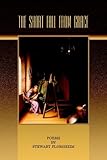 THE SHORT FALL FROM GRACE by Stewart Florsheim
THE SHORT FALL FROM GRACE by Stewart FlorsheimMy review
rating: 3 of 5 stars
This review was mentioned in Fran Moreland Johns's posting of "Old Words, New Words" in The Red Room
Stewart Florsheim is bold and brave in his poetry collection, "The Short Fall From Grace." His memoir poetry flings itself into the topics of family turmoil (witnessed between his mother and father), coming of age sex, and a near escape from a pedophile -- Florsheim flaunts his vulnerabilities and I applaud him for this. So many poets and writers only want to reveal bits and pieces of their inner lives and experiences, which leaves their work sounding false.
Growing up in New York City, Florsheim is the son of German/Jewish refugees. His father was a butcher and his mother frequently lashed out at her husband, condemning his simple tastes and quiet nature, calling him "stupid" to his face. Besides Florsheim's ventures into his past, he also masters the ekphrastic poem, joining such notables as John Keats, W.H. Auden, William Carlos Willams who also wrote poems based on art. In his interpretations of classic and early 20th century art, his subjects come alive, so we feel these characters jump out of their oil paints. My favorite poems were these art poems, including "The Jewish Bride" (based on the same name as Rembrandt's painting, 1667) and "The Best Bread in Montparnasse" (after the painting Le Dejeuner Sur L'Herbe, by Manet, 1863). He choses paintings that involve relationships between men and women, which build upon the narrative's conflict and complexity.
He references events and themes in several poems. For instance, when he was 5 he tells us that he decided to stop eating and he mother would parade his naked body around in front of her neighbors to show them how much he resembled a concentration camp victim. To make sure he fattened up, she would mix egg yolks into his chocolate milk. This incident is mentioned in five of his poems: "Thirst," "Rappel," "Survival," "December, 1999," and "Retribution."
There's also humor woven in with the hurt of a little boy lost, which make these poems accessible to readers. Florsheim is a master of the narrative form, especially in his art poems. I'll close with a few lines from the poem "Unseen," which speak about a truth of human nature:
We are compelled by what we can't see
so that we might be surprised
by the things we already know --
The one thought we prey upon,
not unlike the way a bat stalks a grasshopper,
swoops down, then misses.
View all my reviews.





No comments:
Post a Comment